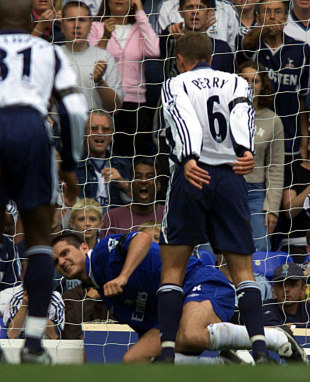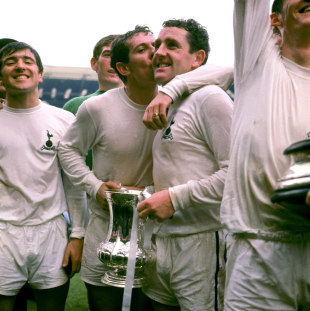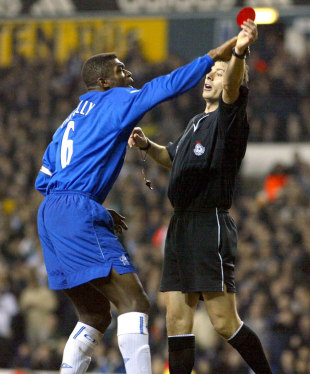- First XIs
Spurs v Chelsea crackers

The London derby between Tottenham and Chelsea brings out a fierce rivalry in the fans and has produced some memorable encounters over the years. Here, we select our First XI clashes.
Tottenham Hotspur 2-1 Chelsea (Division One, 1909-10) <BR> The clubs had not met in a competitive match before December 1909, with Chelsea having spent the previous two seasons in Division One while Spurs had only joined the Football League the previous year. The first meeting saw both clubs struggling - Chelsea 18th and Spurs 19th in a 20-team league - but still attracted a huge crowd of 40,000 to Stamford Bridge as Chelsea ran out 2-1 winners.
An FA Cup clash followed in February, which Spurs won 1-0, but there was to be one truly significant meeting between the sides on the final day of the season: both knew victory would spare them from relegation. Tottenham were in 17th on 30 points, ahead of Bristol City on goal difference, while Chelsea were a further point behind in 19th. "Tottenham and Chelsea meet, and never has there been so much excitement in London so far as League football is concerned," the Daily Express reported.
Spurs doubled their prices, but that did nothing to stop another estimated 40,000 crowd packing in to White Hart Lane. Chelsea had controversially invested heavily in their squad towards the end of the season to aid their battle for safety, and after only five minutes the big spenders were in front.
By the break, though, Spurs were level when Billy Minter - who had earlier withdrawn from the match through injury - came back onto the field to take advantage of poor defending. Early in the second half, Percy Humphreys - who had left Chelsea for Spurs barely five months earlier - netted the winning goal and condemned his former employers to the Second Division. "It was as if pandemonium had been let loose," the Daily Mirror reported.
Chelsea finished in 19th with 29 points, which remains their worst total for a season, and suffered their first ever relegation.
Tottenham Hotspur 5-0 Chelsea (Division One, 1920-21)
Tottenham's biggest ever win came in October 1920. They had just been promoted after their first season back in Division Two, having been relegated in controversial circumstances after the First World War; Chelsea, meanwhile, were struggling but had finished third in the top-flight the previous year.
The 5-0 result was, despite the respective positions, an almighty shock, and the reporter for the Daily Express said he declined to speak to the defeated Pensioners in the aftermath. "It would be worse than indecent to intrude on such as spectacle of poignant grief as must have followed the meeting between the Chelsea officials and the Chelsea players," the reporter said.
The teams would meet again a week later at Stamford Bridge before a 70,000-strong crowd that included the Prince of Wales and the Duke of York, and there Spurs defeated Chelsea 4-0, which remains their record victory at the ground. The result left Chelsea at the foot of the table, but they recovered to finish 13 points clear of trouble by the end of the campaign.
Tottenham Hotspur 2-1 Chelsea (FA Cup final, 1966-67)
The first ever all-London FA Cup final inspired great expectations, and anticipation was rife, with touts charging record prices for tickets as 100,000 packed into Wembley.
Bill Nicholson's Tottenham were already four-time winners of the competition, including back-to-back successes in 1961 and 1962, and went into the game on the back of a 23-game unbeaten run that saw them finish third in the league. "We have the feeling that we are unbeatable," Spurs captain Dave Mackay said. "We will win the Cup."
Chelsea, whose defeat in 1915 had been their only previous cup final experience, had finished ninth and their fans were hoping against hope. "As their supporters have been saying cynically for months," The Guardian reported, "Chelsea have been playing badly enough to win the cup."
The scoreline that day matched many of the pre-match predictions - Chelsea utility man John Boyle even revealed that he'd foreseen it in a dream ("I woke up really miserable") - but the Cockney Cup did not live up to expectations. Tottenham won 2-1 courtesy of goals from Jimmy Robertson and Frank Saul either side of the break, with Bobby Tambling's 85th-minute header coming too late to avert Chelsea's fate. "I enthused that this would be a joyous, knees-up, knocked-'em-in-the-Old-King's-Road affair," Express columnist Desmond Hackett, who had also accurately predicted the scoreline, wrote. "Unhappily, Tottenham's 2-1 win over Chelsea was as sedate as a tea party at Buckingham Palace."

Chelsea 3-2 Tottenham Hotspur; Tottenham Hotspur 2-2 Chelsea (League Cup semi-final, 1971-72)
There was high drama throughout the two legs of this semi-final as Tottenham defended their League Cup crown. Chelsea, knowing their opponents were almost unbeatable on home turf, had played the first leg at Stamford Bridge on December 22 in need of victory, and they took the lead on 39 minutes when Peter Osgood steered home. However, Spurs scored twice in the space of two minutes in the second half through Terry Naylor and Martin Chivers, and with 15 minutes to play the Blues had a mountain to climb.
Chris Garland headed home to equalise, though, and Naylor went from hero to villain four minutes from time when he handballed in the area and allowed John Hollins to net the winner from the spot.
The rest of the drama would have to wait until January 5, when Chelsea progressed by virtue of what The Guardian labelled "one of the most dramatic, unexpected and freakish of goals" in the dying seconds. Chivers had opened the scoring for Spurs just before the break and, after Garland restored Chelsea's aggregate advantage on 63 minutes, Spurs looked to have forced extra-time when Martin Peters made it 2-1 from the spot after Alan Hudson handballed in the area with four minutes to play.
Then came the controversy. Spurs defender Mike England fouled - or obstructed - Peter Osgood near the corner flag. Alan Hudson whipped it in, Spurs defender Cyril Knowles swung a boot and missed it, and the ball squirmed past Pat Jennings. Tottenham furiously protested that the free-kick was for obstruction and should have been indirect - particularly as referee David Smith had appeared to signal as much - but the goal stood and the official told the Daily Mirror: "Why did I put my hand out? Certainly not to indicate an indirect free-kick. It was a breaststroke action, to indicate to the crowd that England had handled Osgood off the ball."
Chelsea went on to the final, where they were beaten 2-1 by Stoke.
Tottenham Hotspur 2-0 Chelsea (Division One, 1974-75)
The final-day drama of the 1909-10 season may never be matched, but the White Hart Lane meeting of April 1975 offered a fine imitation: with three games to play, Spurs were third from bottom and Chelsea just a point and a place ahead. The Chelsea fans had endured a similar situation as recently as April 1974, when a 2-1 victory at Tottenham had ultimately spared them relegation in a result that manager Dave Sexton said gave him "more pleasure" than the team's 1970 FA Cup success.
Sexton was gone by April 1975, though, with Eddie McCreadie newly appointed and dispensing with the old guard in favour of a young side led by 18-year-old captain Ray Wilkins. "It's not a gamble," McCreadie said when questioned on his selection. "There have got to be changes here."
Tension ahead of the encounter was running understandably high, and the match itself was nearly postponed after violence flared during a pre-match pitch invasion described as "horrible" by Spurs chairman Sidney Wale, but the game got underway after a delay.
The young Blues side fared well for 57 minutes before Steve Perryman fired Tottenham ahead, and when Alfie Conn netted a second for Spurs, victory was assured and the hosts were out of the drop zone. Luck had been against Chelsea, who had seen two goals disallowed for handball, but the standard of performance mattered little. "The door of the condemned cell swings on Chelsea as Tottenham earned themselves the chance of a late pardon for the sins of their season," The Guardian reported.
Spurs finished a point clear of trouble, while Chelsea drew their final two games and went down in 21st place, bringing an end to a 12-year stay in the top-flight.
Chelsea 4-3 Tottenham Hotspur (Premier League, 1993-94)
This was a match that had everything bar quality - a seven-goal thriller decided in the dying seconds between a Chelsea side that had not won for four games and a Spurs side that had lost their previous six. "There were so many soft goals that it was possible to walk away from Stamford Bridge with the impression both sides had lost," The Guardian reported.
Spurs opened the scoring on 18 minutes through Steve Sedgley, and an unmarked Jason Dozzell instantly doubled their advantage, but goals from Mal Donaghy and Mark Stein - again, unmarked - had made it 2-2 by the 33rd minute, and seven minutes later Chelsea were in front when John Spencer was given the space he needed to strike.
Andy Gray netted an equaliser from the penalty spot on 73 minutes but nine minutes later, presented with his second penalty, Gray's effort was saved by Dmitri Kharine. To add salt to Gray's wound, Spurs defender Dean Austin fouled Gavin Peacock in injury time, and Stein stepped up to give Chelsea the three points. "The lasting memories will be of two sides committed totally to attack in the image of their respective managers Glenn Hoddle and Ossie Ardiles," the Express said, "although it would contravene the Trades Descriptions Act to say either team fielded a defence."
Tottenham Hotspur 1-6 Chelsea (Premier League, 1997-98)
Aside from an 8-1 wartime victory in 1915, Chelsea's biggest win over Spurs came at White Hart Lane in December 1997. The Blues had not lost to Spurs since February 1990 and had taken to referring to their opposition's stadium as Three Point Lane, and things were to hit an all-time low with the arrival of Christian Gross.
The Swiss had been ridiculed in the British press from his first press conference when he appeared brandishing a tube ticket ("I want this to become my ticket to the dreams"), and they had made a disastrous start to the season, lying 17th by the time of Chelsea's arrival.
On the day, they had actually been holding on at 1-1 at half-time - Tore Andre Flo and Ramon Vega exchanging goals just before the break - but collapsed from the moment Roberto Di Matteo made it 2-1 in the 47th minute. With Gianfranco Zola dropping deep to pull the strings, Dan Petrescu and Mark Nicholls added to the scoreline while Flo completed a hat-trick.
Tottenham Hotspur 5-1 Chelsea (Worthington Cup semi-final second leg, 2001-02)
The aforementioned unbeaten run that began in February 1990 would eventually stretch to 26 games, but it came crashing to a halt in a League Cup semi-final meeting in January 2002.
Having won the first leg 2-1 courtesy of two goals from Jimmy Floyd Hasselbaink, the Blues were deemed to have one foot in the final. However, as Paul Weaver wrote in The Guardian after the second leg at White Hart Lane: "It was difficult to judge whether Chelsea or history was the more cruelly ridiculed here last night as Tottenham moved into the final with a performance of some brio."

Steffen Iversen had put them ahead on away goals after two minutes before a superb long-range Tim Sherwood goal and a Teddy Sheringham volley made it 3-0 on the night. Hasselbaink was then sent off in a case of mistaken identity after Mario Melchiot had slapped Sheringham, and Simon Davies and Sergei Rebrov made it 5-0. Mikael Forssell then registered a superb goal for Chelsea in the dying moments to at least avert a repeat of Chelsea's biggest defeat to their London rivals.
Chelsea 3-3 Tottenham Hotspur (FA Cup quarter-final, 2006-07)
Jose Mourinho had said ahead of this FA Cup quarter-final that he did not want a replay, but by the end was lavishing fulsome praise on his players for salvaging a draw.
Tottenham had run up a 3-1 lead by half-time courtesy of goals from Dimitar Berbatov and Hossam Ghaly either side of a Michael Essien own goal. Mourinho, already without Claude Makelele and John Terry, was left to go for broke with his substitutions. With Ricardo Carvalho and Khalid Boulahrouz the only recognised Blues defenders on the field, Frank Lampard added to his first-half strike in the 71st minute before Salomon Kalou, who had replaced Ashley Cole, completed the comeback. "I contributed with my substitutions but the players did it," Mourinho told the BBC after the game. "It is all about the players. We were almost out of the FA Cup when we were two goals down but at the end we are still in the competition."
The match also provided a worrying reminder of the hatred that remains between the two sets of fans: ten fans were stabbed after hooligans bearing knives, baseball bats, wooden clubs embedded with nails and hockey sticks attacked a pub near Stamford Bridge.
Chelsea won the replay 2-1 at White Hart Lane before going on to win the competition.
Tottenham Hotspur 2-1 Chelsea (Carling Cup final, 2007-08)
London pride and the chance for silverware were at stake in the first cup final at the new Wembley Stadium, but it was also a chance for two managers to show they were equipped for the job. Both clubs had dismissed popular bosses earlier in the season - Jose Mourinho departing in September and Martin Jol in October - and the new men were expected to kickstart their clubs after disappointing starts.
By the time of this meeting in February, both Avram Grant and Juande Ramos had brought about an improvement in form, with the latter having secured a major PR coup when Spurs thrashed Arsenal 5-1 to book their place at Wembley.
Questions lingered over Grant, but Chelsea remained the favourites, and the Blues took the lead through a Didier Drogba free-kick late in the first half. On 70 minutes, though, Spurs were level when Dimitar Berbatov converted a penalty after a Wayne Bridge handball, and new signing Jonathan Woodgate completed the comeback at the start of extra-time after Petr Cech punched the ball into his head.
Tottenham Hotspur 4-4 Chelsea (Premier League, 2007-08)
Less than a month after the Carling Cup final, Chelsea paid a visit to White Hart Lane, and Spurs, enjoying the moment, played videos of their triumph prior to the kick-off. It was to set the stage for a thunderous London derby.
Chelsea had drawn first blood when Didier Drogba headed the opener on three minutes, but Jonathan Woodgate equalised nine minutes later. Michael Essien then made it 2-1 on 20 minutes with a wonderful finish after superb work from Joe Cole.
Before the break, Ashley Cole launched into a strong tackle on Alan Hutton, receiving only a yellow card but prompting a moral outcry after turning his back on referee Mike Riley ("I recognise this is a part of my game I need to work on and control," he later said).
Joe Cole then made it 3-1 after the break, but a Dimitar Berbatov header and a Tom Huddlestone drive brought Spurs level at 3-3. Cole added his second of the game with ten minutes to play but, with two minutes remaining, Robbie Keane unleashed a curling 20-yard drive to made it 4-4, and it was only thanks to a superb late save from Carlo Cudicini to deny Berbatov that Chelsea left with anything at all. "The players are not so happy," Avram Grant said afterwards.

